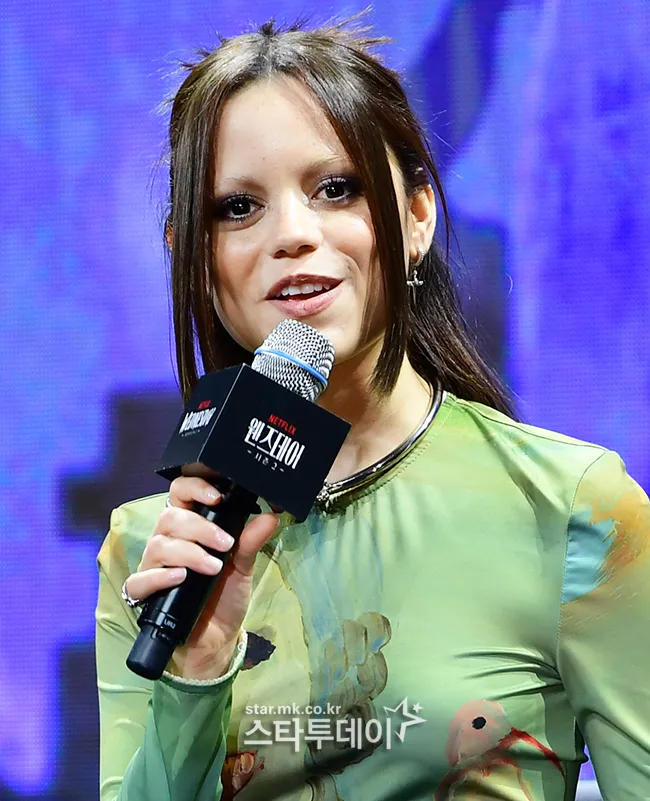

If Wednesday Could Talk, She’d Reveal Jenna Ortega’s Stunning Rise to Power
In a world full of noise, Jenna Ortega taught us the power of silence. Her performance as Wednesday Addams in the Netflix phenomenon Wednesday isn’t just a breakthrough — it’s a cultural earthquake, redefining how characters — and by extension, women — can be present, powerful, and deeply felt without uttering a flamboyant line.
If Wednesday could talk — truly speak, outside of her iconic one-liners — what might she say about identity, authenticity, boundaries, and the unspoken strength of simply being? Through Jenna’s embodiment of the character, she silently answered that question: with posture, with gaze, with mood. She didn’t need words to tell us who Wednesday is — because she showed us, unmistakably.

The Resonance of Stillness
In today’s hyperactive media landscape, it’s rare for quietude to be the main event. Most characters in television tilt toward melodrama or emotional excess to catch attention. But Jenna Ortega’s Wednesday flips this assumption on its head. Her presence arises from restraint, from gestures measured to the beat of internal monologue rather than external applause.
In her calmness, there’s chaos. In her expressionless face, there’s turmoil. Her eyes alone communicate depths of intelligence, sarcasm, and sardonic wit. It’s a performance rooted in subtle emotional communication — a near-vanishing art in an age of hyper-expression.
Moreover, this kind of understated power elevates the narrative. It teaches viewers that emotion doesn’t require volume. And that silence, when wielded intentionally, can speak louder than any shout.
Quiet Rebellion: Redefining Feminine Power
Wednesday Addams isn’t quiet because she’s subdued — she’s quiet because she’s sovereign. In a world poised to silence deviations with mini-skirts and lipstick, she defies. In her lack of performative emotion, she upends expectations of femininity.
This silent rebellion reflects a wider cultural shift, especially for Gen Z and emerging women: rejecting performative politeness, refusing emotional labor, sidestepping approval-seeking behavior. Jenna Ortega didn’t just play this archetype — she embodied a generation’s desire to be respected for their authenticity, not appeased for their compliance.
Wednesday’s tactility — her posture, her critical pauses — expresses an ideology. Strength isn’t always loud. Resistance isn’t always violent. Sometimes, it’s stillness in a shouting room.
A Latina Wednesday: Seamless Representation
Jenna Ortega’s Wednesday carries an identity layer often overlooked but crucial: she is Latina — and yet Wednesday feels wholly her own, not a derivative rewriting.
Ortega doesn’t inject “Latina” energy as a separate tint — she simply is Wednesday. Her physicality, her cadence, her energy all come filtered through her character, naturally and without overt nods to ethnicity. This is representation at its strongest: visibility that is intrinsic, not performative.
In an industry that often insists on marking identity heavily, Jenna’s approach teaches that authenticity can be subtle — and still revolutionary. She expanded what “Wednesday Addams” can look like, and did so by staying true to both herself and the character — effortless representation that resonates with cultural depth.

Boundaries as Strength: Quiet Control in a Noisy Age
One of the most radical traits of Jenna’s Wednesday is her impermeability. She curates her inner world. She doesn’t answer questions she finds pointless. She discards pleasantries. In our era of oversharing, this reins of personal agency feels revolutionary.
Through her, Jenna illustrates a principle often neglected in celebrity culture: self-respect through silence. Saying “no” doesn’t have to involve a dramatic confrontation — it can be a look, a pause, an absence.
Young audiences watching see empowerment in control over one’s exposure. In Wednesday’s composed armor, they find permission to protect their peace and hold onto their core.
Jenna Ortega and the Pressure of Carrying a Cultural Icon
One of the most underappreciated aspects of Jenna Ortega’s performance as Wednesday Addams is the immense weight of expectation she had to carry.
Taking on the role of an iconic character, previously immortalized by the likes of Christina Ricci, was never going to be easy. The Addams Family has been a cornerstone of alternative pop culture for decades. Wednesday Addams, in particular, symbolizes the perfect cocktail of wit, darkness, and eerie charm.
Yet, Jenna didn’t just imitate a classic — she redefined it.
She brought Wednesday into the 21st century without sacrificing the essence that made her timeless. This required not only technical skill as an actress but a deep, instinctive understanding of what the character means to millions.
Moreover, she had to do it under a microscope. As a young woman of color, as someone still transitioning from her “child star” image, and as an actress stepping into a global phenomenon, the pressure to be perfect was relentless.
But Ortega’s answer was not perfection — it was authenticity. She didn’t try to outdo previous versions. She made the character entirely her own. She leaned into discomfort, embraced the awkwardness, and channeled real emotion through deadpan stillness.
The result? A performance so honest, so grounded, and so quietly powerful that it made Wednesday relevant all over again — not just as a character, but as a cultural symbol.
The Voice Behind the Stillness
Paradoxically, while Wednesday speaks little, Jenna Ortega herself speaks loudly — through interviews, activism, thoughtful perspectives on mental health, and representation. She’s candid about the pressures of youth stardom, the necessity of creative boundaries, and her need to be authentic off-screen.
This duality — the silent character and the outspoken artist — is what elevates the performance. Jenna isn’t attempting to be Wednesday; she’s channeling her. She understands the irony that although Wednesday gets so much attention, the performer chooses to let essence shine through economy — not flamboyance.
It’s an artistic humility rooted in precision: saying less so the performance says more.
The Wednesday Effect: Cultural Impact and Beyond
Since Wednesday’s release, cultural tremors have been felt far beyond the confines of fiction:
Fashion has shifted. Gothcore became mainstream. Black slip dresses, braided hair, stark minimalist aesthetics flooded feeds.
Social media embraced her fully. TikTok was flooded with the viral dance. Memes echoed her deadpan wit. But the real impact? It’s identity. Self-expression. The normalization of being “different.”
People embraced “darkness” not as sorrow, but as elegance and self-possession. Being different went from a flaw to a badge of pride. And in doing so, Jenna Ortega didn’t just play a character — she awakened a global movement.
If Wednesday Could Really Talk…
She wouldn’t need to say much. She might smirk. She might look sideways. She might simply say, “Told you.” Because the work is done not through exposition — but through presence.
But if pressed, she might reveal this: the most subversive act is to simply exist as you are, and to communicate through the space between words.
And behind her, Jenna Ortega would nod — showing us that silence can be strength, and that the most watched minority is often the one who says least, but means most.

Conclusion: Silent Echo, Mighty Impact
Jenna Ortega’s Wednesday Addams isn’t just a character — she’s an emblem of quiet rebellion. She proved that strength can be subtle, representation can be natural, and authenticity can warp expectations.
Her impact invites introspection: in a world addicted to volume, dare you speak softly? In a culture of noise, dare you stay quiet?
Because this is the paradox of power: sometimes, the fiercest shout is uttered through silence.


















